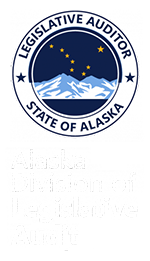| SUMMARY OF: | Department of Family and Community Services, Office of Children’s Services Implementation of Foster Care Reform Laws, Part 3 |
Purpose of the Report
This audit reviews Department of Family and Community Services’ (DFCS) compliance with select HB 151 foster care reform laws. Additionally, the audit determines whether DFCS’s management structure over the foster care system is in line with best practices, reports permanency measures, and concludes as to the overall impact of foster care reform.
Report Conclusions
The audit concluded that foster care reform did not effectively increase services for Alaskan children. Implementation of HB 151, along with other legislative efforts enacted from FY 16 through FY 23, failed to resolve the Office of Children Services’ (OCS) labor challenges despite the legislature appropriating over $20.7 million of additional funding and authorizing 110 new frontline caseworker and support positions. High vacancies and turnover led to excess budgetary authority, which was used, in part, for other purposes.
Caseload limits, referred to as “caseload caps”, could not be fully implemented due to a lack of workers. Of the 115 case carrying workers with at least seven months of experience as of March 2024, 80 workers (70 percent) exceeded the average caseload cap of 13 families, with 52 workers (45 percent) carrying between 20 to 48 cases.
As a result of HB 151, the number of training weeks increased from a minimum of two weeks to a minimum of six weeks; however, the training method switched from in-person to virtual. Around the same time training became virtual, OCS began hiring workers with “core competencies” rather than hiring workers with a college degree or prior work experience. The audit questions whether five weeks of virtual training and one week of mostly remote mentoring is adequate to turn new hires with core competencies into qualified frontline caseworkers.
When considering OCS’s workload, policy makers and other stakeholders should recognize that statutory requirements for OCS’s annual recruitment and retention report understate OCS’s workload. Specifically, the caseload data does not include cases managed by supervisors and other non-case carrying employees. As of March 15, 2024, 402 cases were assigned to 49 supervisors and other non-case carrying employees. Additionally, the report does not include secondary case assignments, which vary in the amount of work required and could resemble a primary assignment.
Auditors found that OCS’s 2023 annual staffing report understated vacancies at the statewide and regional levels. Furthermore, the staffing report did not fully comply with statutory requirements, regional turnover statistics were not fully accurate, and supporting data was not consistently maintained by OCS staff.
A legislative consultant found that OCS’s staffing report could be enhanced to better align with best practices. Furthermore, the consultant recommended changes to better align OCS management with best practices. Improving OCS’s hiring process is critical to addressing labor challenges.
Federally required performance measures indicate that Alaska’s children had lower permanency within the first two years than experienced nationally. Permanency after two years was generally consistent with national norms. Alaska’s re-entry into foster care was better, or within, the national rates except during FFY 22. Placement stability rates were better than national rates in some years but worse in others.
Findings and Recommendations
- OCS’s director should implement procedures to ensure the annual staffing report is accurate.
- OCS’s director should implement procedures to ensure the annual recruitment and retention report is accurate and prepared in compliance with state law.
- OCS’s director should consider implementing a more comprehensive training program that is grounded in practical applications.
- OCS’s director should continue to implement hiring best practices.
- OCS’s director should consider enhancing data to align with best practices and make recruitment and retention efforts more meaningful.
- OCS’s director should develop a forward-looking plan for addressing recruitment and retention challenges.
- Department of Health’s assistant commissioner of finance and management services should liquidate an unsupported $10 million encumbrance.

